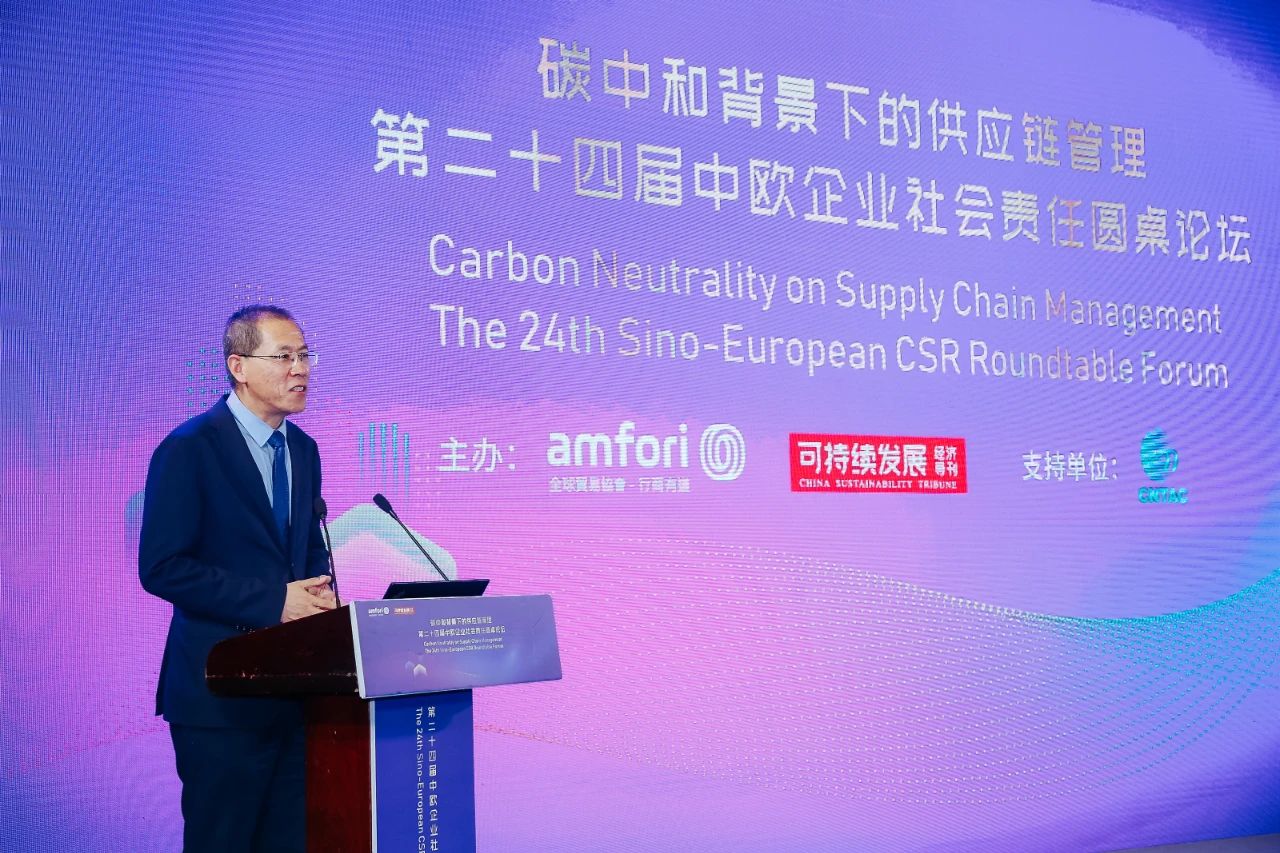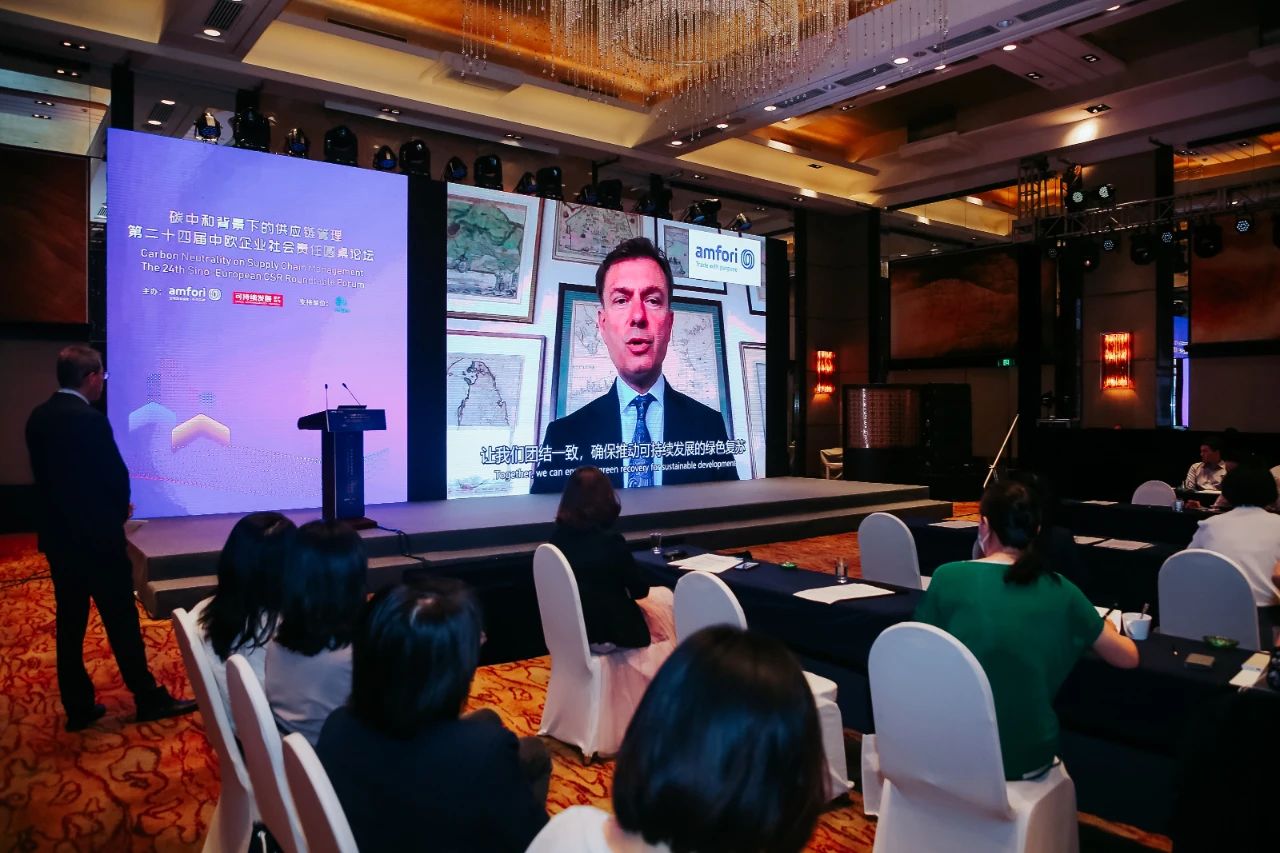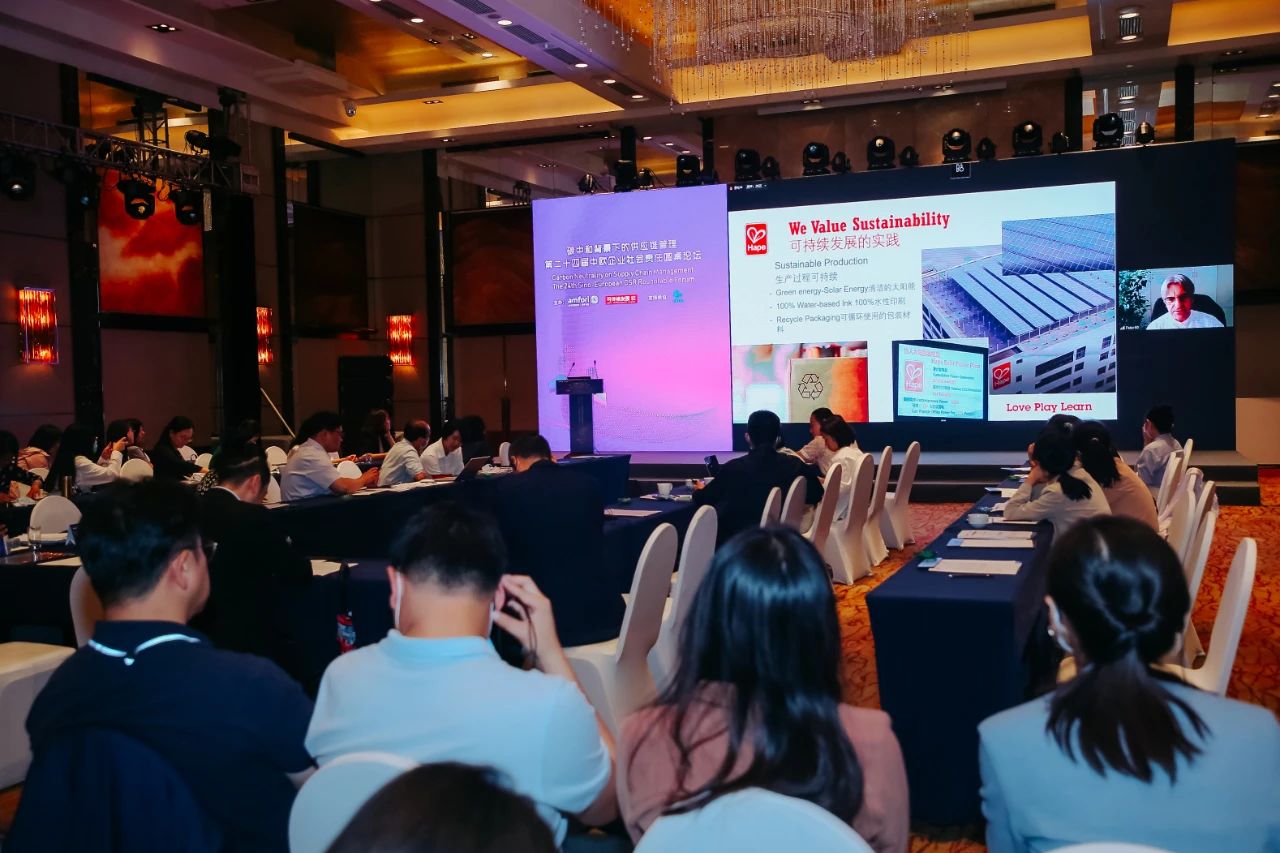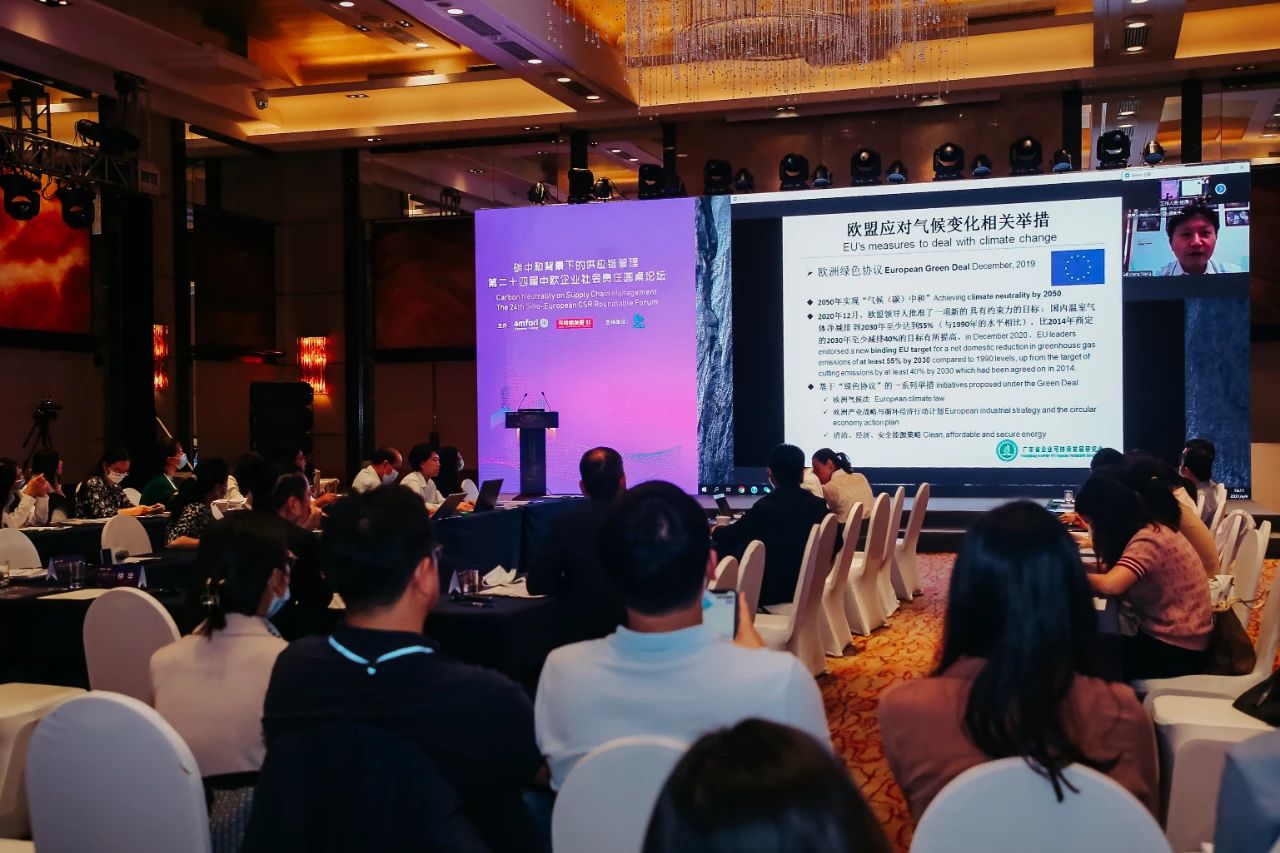Carbon neutrality on supply chain management
Release time:2022-07-06Source:Author:
The realization of the carbon neutral supply chain is a complex issue. It requires not only a consensus, but also strong technological and financial support

On June 9, 2021, the 24th Sino-European CSR Roundtable Forum, co-organized by the amfori and China Sustainability Tribune, was held in Beijing.Focusing on "Carbon neutrality on supply chain management", the Forum invited representatives from governments, associations, well-known companies and sustainability experts to share their perspectives on how to leverage the effective carbon emission reduction measures to enhance the cooperation among supply chainpartners and contribute to the goal of carbon neutrality by innovation and practice of carbon management.
The goal of carbon neutrality fosters high-quality developmentIn September 2020, China made a new commitment to peak carbon dioxide emission before 2030 and achieve carbon neutrality before 2060 at the 75th UN General Assembly, which has exposed profound impact on the business community, the whole society and the international community. By now, nearly 130 countries have proposed goal of carbon neutrality.

Xu Hua, Director, General Office, Department of Industrial Policies, Laws and Regulations,Ministry of Industry and Information Technology (MIIT)Mr. Xu Hua stressed that carbon neutrality has become a core issue of economic and social development in the new development stage. It will facilitate the high-quality economic development and the ecological conservation in China, driving the overall social progress.In this context, the MIIT will thoroughly implement the decisions and deployments of the CPC Central Committee and the State Council on carbon peak and carbon neutrality. It will advance industrial low-carbon actions and green manufacturing projects, and develop carbon peak action plan and roadmap for key industries. To accelerate the green and low-carbon transformation, industrial enterprises and parks will be encouraged to build green microgrids, use renewable resources to a limited extent, and build green factories and green industrial parks in different industries and regions.To this end, targeted programs and measures have been promoted, such as, the standard system and policy mechanism have been improved, the environment for public services and CSR fulfillment has been optimized, and related research and international exchanges have been extensively advanced. The goals of carbon peak and carbon neutrality put forward higher requirements for our following work. Mr. Xu called on all walks of life to jointly boost the high-quality and sustainable development, making it more recognized by the public and the international community.

Christian Ewert, President, amforiGlobal collaboration is essential to shape the economy in ways that are clean, green, healthy, safe and more resilient. Mr. Ewert shared the view in this speech, “The whole world should get together to strengthen the global response to the threat of climate change and contribute to the carbon emission and environmental protection.” The European Green Deal is a new growth strategy to help cut emissions while creating jobs. China’s 14th Five-Year Plan will also be a crucial element in shaping a new, more environmentally friendly era. The EU and China share common goals in this aspect, which pave the way for cooperation between stakeholders and industrial partners of both sides. Enterprise practices activate sustainable supply chainsDriven by the goal of carbon neutrality, the role of green supply chain management in reducing pollution and carbon emissions and ensuring the safety and stability of the industrial chain has become increasingly prominent. A group of pioneer companies have achieved remarkable results in reducing greenhouse gas emissions via green supply chain management, enlightening the sustainable management of the supply chains in the future.

Peter Handstein, Founder & CEO of Hape GroupMr. Handstein introduced Hape’s sustainability practices, including the philosophy of “act locally& think globally”, use of renewable resources, supply chain partnerships and measures taken. Through the extensive use of sustainable materials, Hape has reduced the impact on the environment to a certain extent. Hape continues to innovate in product design, and works towards sustainable supply chains with partners based on trust, equality, respect and commitment. The key to the rapid development of Hape in China lies in the deep understanding of the Chinese market, the use of sustainable materials, and high standards in the production process.
Meng Wei, President of CMSK Urban InstituteMr. Meng shared the green supply chain management practices of China Merchants Shekou Industrial Zone Holdings Co., Ltd (CMSK), especially the impact, actions and plan in response to the goal of carbon neutrality.Green supply chain policies have been integrated into all aspects of the real estate industry from the latest green and low-carbon city, Shekou, to other cities that use green building products. Mr. Meng suggested that, in order to achieve carbon neutrality in the supply chain, it is necessary to change the traditional procurement model and realize comprehensive green management of the supply chains. By so doing, we can minimize the impact on the environment and achieve the balance of economic and environmental benefits.CMSK lists green building materials as its main procurement project during sourcing building materials. To build green supply chains towards carbon neutrality, the company has initiated the first green manufacturing convention in Chinese real estate industry- CMSK Green Quality Manufacturing Convention for "Carbon Neutral" Supply Chains.Joint efforts to explore the path to carbon neutral supply chains
Yu Zhihong, President and Editor-in-chief, China Sustainability Tribune"The realization of the carbon neutral supply chain is a complex issue. It requires not only a consensus, but also strong technological and financial support, and the integrated management systems. All these cannot be achieved by an organization or a company. In this aspect, it further highlights the value of the supply chain partners.” said Mr. Yu. He also proposed to adhere to the following common experiences and practices for achieving carbon neutral supply chains by all parties: first, to develop best practices; second, to insist on cooperation; third, to launch a unified standard tool; fourth, to demonstrate sufficient confidence.

Jack Wang, Chief EHS expert, Guangdong Academy of Corporate Sustainable DevelopmentThe view was also resonated with other speakers. Mr. Wang compared the process of achieving carbon neutrality to the two ends of a balance in his keynote speech: with carbon dioxide emissions on one side and the carbon dioxide captured by green plants on the other. In the real world, due to the limited forest area, the amount of carbon dioxide captured is also limited. To truly realize the balance, more effort should be placed on the emissions.Mr. Wang believed that there are two ways to reduce the carbon emissions. The first is to vigorously develop renewable energy that does not produce carbon dioxide, and the second is to introduce relevant laws and regulations to address climate change. It requires a two-pronged approach to continuously promote energy conservation and emission reduction.

Hu Kehua, Director of Sustainability Stewardship Programs, China Textile and Apparel Industry Council (CNTAC)Mr. Hu put forward three key words for the supply chain management in the fashion industry: consensus, compatibility and reconstruction. In the past, the global market paid great attention to the sustainable development of the textile industry, but the industry still faced many difficulties despite of its pioneering role. Due to the complexity of the supply chain structure, how to reach a consensus on the UN SDGs has become a difficult problem at hand. However, only by reaching a consensus can we act in concert and achieve our goals efficiently.Mr. Hu believed that carbon neutrality should become a global consensus that can be implemented. To build carbon neutral supply chains, it is necessary to have a change in awareness and develop the innovative practices, which can facilitate industry development and environmental improvement.As more and more people pay attention to and join in the action, the cooperation between people will become closer and the realization of common goals will come closer, finally contributing to the sustainable supply chains and even a better future.
The Forum provided a live streaming channel on the internet with nearly 180,000 views. As a professional and practical communication platform and channel for corporate social responsibility (CSR), the Sino-European CSR Round Table Forum has focused on the building of responsible supply chain for many years, covering related topics such as employee care, harmonious labour relations, good communication mechanism and partnership between buyers and suppliers. Held 23 times in the past years, it has been well received by stakeholders and conducted with great support from participants, including relevant Chinese government departments, CSR organizations as well as Chinese and European enterprises.
Article release:可持续发展经济导刊








 Back
to top
Back
to top